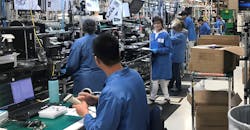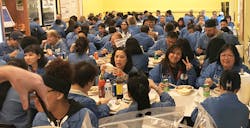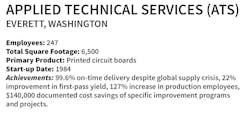2018 IW Best Plants Winner: ATS Defies the World
Applied Technical Services (ATS) had a hard year. A very hard year.
Tucked into a neat industrial park in Everett, Washington, ATS provides a full spectrum of solutions and services around printed circuit board production—from assembly and box builds to testing and engineering.
This means—in our IoT-crazed, smart-everything world, with circuit boards embedded in every product from sneakers to streetlights—ATS has found itself in one of the hottest markets imaginable. But that hotness comes at a price.
"Demand outstrips supply," explains George Hamilton, ATS CEO. "It's that simple."
Basically, he says, the rush to add digital intelligence into every product—and especially autos—has strained the suppliers of the diodes, transistors, capacitors and all those microscopic circuit board components far beyond capacity.
This deficit has left manufacturers like ATS in a tough situation.
"We saw lead times [for components] go from four weeks to 16, from 18 to 52," he says. "And, of course, when supply goes down, prices have to adjust."
Meet the IW Best Plants Winners at 2019 Manufacturing & Technology, an IndustryWeek event
So in just about every respect, it really seems like, as Hamilton notes, "a brutal, brutal year."
However brutal it was, though, ATS was able to do something rather incredible. Despite swallowing the rising component costs, it has increased revenue by 18% year-over-year for the past three years; despite record-low unemployment, it grew production head count by 126%; despite bloated lead times and part shortages, it achieved 99.6% on-time delivery; and despite all of these market issues and demand crises, it increased its first-pass yield by 22%. In other words, ATS grew, it improved, and it succeeded in spite of the most brutal conditions possible.
The fact that the plant and its 247 workers succeeded marked it as an easy choice for a Best Plants finalist. How it succeeded, though, made it a clear winner.
Serving the Customer
Hamilton lays out the general recipe for success at ATS rather neatly.
It's by "systematically getting better, by putting in processes and procedures, and by following lean principles," he says.
This is a sound plan, grounded in the company's ongoing lean journey, which won it an IW Best Plants award in 2015. The effects of this journey are evident all throughout the plant—from its newly streamlined production and material flows to its digital status boards to the stacks of The Toyota Way sitting at every exit. It's a development Production Manager Chris Dubbs is particularly proud of.
"When I got here, few could even name the seven wastes," he says. "Today, nearly everyone is fully on board, we're developing standard work and standard tools, we have our change agents and we are adapting quickly."
But what really sticks out this year is the culture in the plant that drives it to push through limitations, to succeed in difficult times, to endure years like 2018 to help serve their customers.
"It's almost scary sometimes how eager our people are to take care of the customer," Hamilton says. "It's just part of the culture."
The best example of this relates back to the supply crisis—a challenge that pulled in every level of the plant to overcome.
"When we can't find components, we need to redesign the whole board," Dubbs says.
On the business side of the plant, this means developing and maintaining relationships with both customers and suppliers that are strong enough to survive the process. Just sensitizing customers to the magnitude of the issue is a giant step, Dubbs says.
But the real magic comes from the close relationship between engineering and production to work through these issues.
"We need to provide creative engineering solutions for them as quickly as possible," Dubbs says. That requires a lot of engineering brilliance, of course, but also a constant dialog with production to ensure they have the instructions, equipment and capacity to take it on.
The results of this collaboration can be stunning.
Though the process was initiated out of necessity—a situation that would normally result in compromised quality—"our engineers design new configurations that are equally as good or better than the original," Dubbs says. "That kind of thing really blows the customers away."
Serving Lunch
The full reality of this high-performance culture hit at noon on the day of my visit in early 2019. Suddenly the hum of machines was replaced by a chorus of chatter as the full staff—engineers and production alike—shuffled into the breakroom for a full catered lunch.
The lunch was part of their reward—in addition to a bonus—for meeting quality, delivery and revenue targets for the month. It was, Dubbs noted, the 12th such lunch in a row. Meaning, this team had officially completed a full year of number-hitting, reality-defying success that pushed far beyond any reasonable expectations.
So those burritos were well earned indeed.
As they ate and chatted, celebrating this success, Hamilton hit me with a surprising bit of insight that added another bit of perspective to the culture: After all of this growth, he is planning to ease back in 2019.
"If you drive too fast and you're not ready for it, quality goes down and your on-time delivery goes down," he explained. "Eventually, your customers are going to get frustrated and your employees are going to get burned out."
So Hamilton is doing the most perfect IW Best Plants Award winner thing imaginable: He is easing back in order to bolster the foundations and "focus on continuing to make the processes stand up to the growth."
It's an ongoing grow-fast-and-taper cycle ATS runs to ensure that the company not only grows, but that it does so in a controlled, strategic process. For Hamilton, the long-term benefits of this far outstrip the short-term slumps.
"I mean, profit is important," he said. "But the people who work for you are far more important; your customers are far more important. That's where we need to focus."
But not to worry, he says: "This year still looks like another 8-10% growth without really trying."
About the Author
Travis Hessman
Content Director
Travis Hessman is the editor-in-chief and senior content director for IndustryWeek and New Equipment Digest. He began his career as an intern at IndustryWeek in 2001 and later served as IW's technology and innovation editor. Today, he combines his experience as an educator, a writer, and a journalist to help address some of the most significant challenges in the manufacturing industry, with a particular focus on leadership, training, and the technologies of smart manufacturing.



